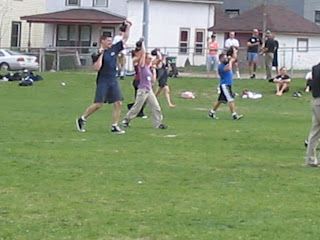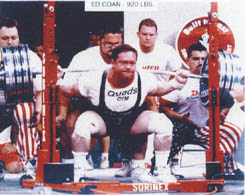What a great article from Randy's blog. This should be required reading for RKCs.
Chin UpHere's a little tip for kettlebell swings and snatches that I have been playing with lately...it's more appropriate for short burst power production kettlebell usage, I think, since it is adapted from Olympic Weightlifting. But I think it will also add a margin of safety and make your power production more efficient for longer, higher repetition efforts.You may first want to read an article I wrote awhile back regarding my take on kettlebell swings and snatches here:
http://www.dragondoor.com/articler/mode3/388/ to get some insight into my take on proper pulling form.The tip I've been playing with is one that I picked up from strength coach Dan John who uses this idea in his Olympic Weightlifting teaching progression. I am finding it also works extremely well with kettlebell swings, cleans and snatches.
First let me review a few things. In my opinion, the four keys to maximizing the powerful posterior chain muscles in kettlebell swings and snatches is to mimic the position Olympic Lifters assume as the bar reaches knee height in the barbell snatch and clean. As the bell swings back between the legs:
1) The knees are only slightly bent
2) Shins are vertical and even tilting back somewhat towards the heels
3) Balance is focused towards the heels
4) The lower back is locked and arched
Think of the position in the kettlebell good morning stretch or a Romanian Deadlift. The kettlebell swing and snatch are not "squatting" exercises...if your knees travel forward during these exercises you are cheating yourself out of a lot of power and diminishing the value of the movements. And don't fool yourself: squatting swings and snatches won't improve your jumping ability, if you are justifying this form break for that reason. Whether one is broad jumping or vertical jumping, the bulk of the power is generated not from the quads but from the hips and hammies.
Don't take my word for it, test it. First, jump with your knees traveling forward and focusing on your quads and see how you do and next try a jump from a good morning/Romanian Dead Lift stance with minimal knee flex, shins vertical and the hips pushed well back...feel free to record your observations in the comments section.So here's the tip: as the kettlebell reaches its furthest point in the backswing, focus on jutting your chin forward and sticking your butt back as far as you can. Visualize stretching the chin and tail bone as far apart from one another as you can.
As the kettlebell swings forward and you start adding power, lead with the chin. Don't throw your head back at the top of the pull, however...you should still finish standing tall with the head in a neutral position, but visualize maintaining the distance between chin and tail bone.If you have correctly executed the four key elements in the backswing position described earlier, your hamstrings should be almost maximally pre-stretched.
By adding this tip, you will not only increase the hamstring pre-stretch even more, you will find your upper body and core more completely locked into one unit and this will facilitate more power transmission from the hips and glutes. Dan John uses the analogy of a bow and arrow. Think of the kettlebell as the arrow in this analogy and the body as the "bow". By stretching the chin and tailbone as far apart as you can, and maximizing the hamstring pre-stretch you are maximizing the tension of the "bow".
The bigger the stretch, the more powerful and explosive will be the release, which is in this case, as in the Olympic Lifts , a vertical jumping motion. Try this tip. Your swing and snatch strength and power, especially with double bells, should improve dramatically.
 Happy Rif
Happy Rif Me and my assistant Marc "Spud" Bartley. What an honor to work with this World Class Powerlifter,. this is one brutally strong man. The man is flexible too, he can get in almost full side splits!
Me and my assistant Marc "Spud" Bartley. What an honor to work with this World Class Powerlifter,. this is one brutally strong man. The man is flexible too, he can get in almost full side splits! Senior Instructor, Pressing Cyborg and serious kb research scientist Kenneth Jay.Can't wait to go to the Danish RKC next year in Copenhagen. Now THAT is going to be fun.
Senior Instructor, Pressing Cyborg and serious kb research scientist Kenneth Jay.Can't wait to go to the Danish RKC next year in Copenhagen. Now THAT is going to be fun. The Dr's Cheng, Courtney and Mark RKC, and Tracy and I. Courtney did two hand swings with the Beast at the end of the day no problem. It does weigh more than her!First time she has even picked up a bell weighing more the 24 kg!
The Dr's Cheng, Courtney and Mark RKC, and Tracy and I. Courtney did two hand swings with the Beast at the end of the day no problem. It does weigh more than her!First time she has even picked up a bell weighing more the 24 kg!




































.jpg)
